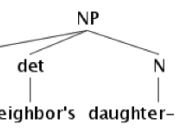I. I'd like to present the topic concerning nominal word-combinations.
II. In the course of my presentation I'd like to cast light upon the following points: types of word-combinations, noun phrases with pre-posed adjuncts and noun phrases with post-posed adjuncts.
III. A phrase is a group of two or more notional words functioning as a whole.
According to the three types of syntactical relations phrases can be classified into subordinate, coordinate and predicative. Subordinate phrases are those whose constituents are connected by means of subordination, or, otherwise, which are based on the head-adjunct relation. Their immediate constituents are head word and modifier (adjunct). The term head word (head) means the word that is modified.
Depending on the part of speech to which the head word belongs there may be: noun phrases, verbal phrases, adjective phrases, pronoun phrases, adverb phrases. It should be mentioned that noun phrases, as well as verb ones, are the most important and widespread.
IV. Noun phrases are subdivided into those with pre-posed adjunct (e.g. these fine pictures, written materials, running water, etc.) and with post-posed adjuncts (e.g. the roof of the house, people present, parties concerned, etc.).
V. The pre-posed adjunct of the noun-phrases in ME can be represented by an adjective, a pronoun, a numeral participle I or II and a noun (either with or without the -s morpheme). Thus, in ME the following patterns of noun phrases with pre-posed adjuncts can be pointed out:
Adj. + N, e.g. charming woman, fine music, old man
Adjectival pronoun + N, e.g. that day, some distance, her hat, no idea
VI. Numeral + N, e.g. thirty-five years, two miles, one person
V-ing + N, e.g. dancing gnats, running water
VII. P.II + N, e.g. written word, boiled egg
The possessive form of a N + N, e.g.


